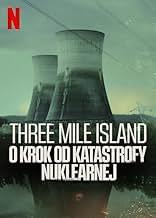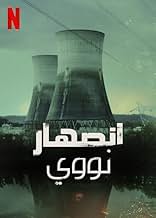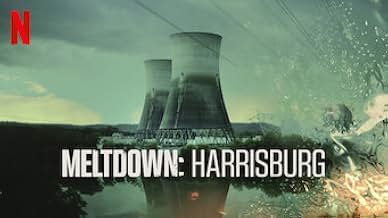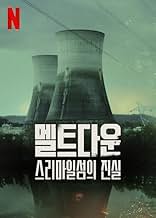IMDb रेटिंग
6.8/10
5.9 हज़ार
आपकी रेटिंग
अंदरूनी सूत्रों ने पेंसिल्वेनिया में थ्री माइल आइलैंड परमाणु ऊर्जा संयंत्र में दुर्घटना की घटनाओं, विवादों और लंबे समय तक चलने वाले प्रभावों का वर्णन किया.अंदरूनी सूत्रों ने पेंसिल्वेनिया में थ्री माइल आइलैंड परमाणु ऊर्जा संयंत्र में दुर्घटना की घटनाओं, विवादों और लंबे समय तक चलने वाले प्रभावों का वर्णन किया.अंदरूनी सूत्रों ने पेंसिल्वेनिया में थ्री माइल आइलैंड परमाणु ऊर्जा संयंत्र में दुर्घटना की घटनाओं, विवादों और लंबे समय तक चलने वाले प्रभावों का वर्णन किया.
- पुरस्कार
- 5 कुल नामांकन
एपिसोड ब्राउज़ करें
फ़ीचर्ड समीक्षाएं
Whoever produced this documentary clearly doesn't like nuclear power. Nearly every single interview & pundit gives an anti-nuclear biased account. The primary pundit (and only employee of TMI) is a disgruntled former employee who fell in love with an anti-nuclear campaigner in the middle of this thing, and greatly over-dramatises his account. A lot of focus is also put on near-clueless residents of the nearby town, who are quite irritating with their over-acted "minute of fame" accounts, and blame every rash on their butt on the incident. They certainly deserve to be heard, but shouldn't be used as replacements for educated voices. And there are barely any educated voices in this documentary. No international opinions, no voices from the current nuclear industry, no industrial safety experts, zero defence or applause of the actions taken by highly skilled people which probably saved many lives, zero mention of the fact the design of the facility worked exactly as it should and prevented a release, and no mention of the vastly improved safety record of the industry. The whole thing is accompanied by cheesy dramatic music to build tension and doom. It's a step down from Netflix's usual standard for documentaries - like something from 15 years ago - and certainly doesn't touch Chernobyl for viewing intrigue. In fact, Chernobyl probably does a better job documenting the incident, and it's not even a documentary.
The story of corruption and mismanagement is not that surprising. Still kinda interesting. But in typical Netflix fashion, long winded and repetitive.
But the real lesson of this documentary is how far we've come in nuclear tech.
We see the complete lack of computer technology in the 1970's. This makes it clear that the US should continue leading the way and sell Gen IV tech to the rest of the world -where the other 95% of humans live, and where carbon emissions are growing at an extraordinary rate. My beloved France and Germany are already returning to nuclear. But the rest of the world is polluting like crazy. Enough is enough.
But the real lesson of this documentary is how far we've come in nuclear tech.
We see the complete lack of computer technology in the 1970's. This makes it clear that the US should continue leading the way and sell Gen IV tech to the rest of the world -where the other 95% of humans live, and where carbon emissions are growing at an extraordinary rate. My beloved France and Germany are already returning to nuclear. But the rest of the world is polluting like crazy. Enough is enough.
I didn't feel like this was about fear in nuclear energy. This event set it back, but it's still viable and prevalent. This is about human error, regulation failure, and high level corporate and government corruption.
This is an amazingly well produced docu-series from Netflix once again. It's the gold standard in documentaries these days so you get what you expect. It seems to have been produced during covid lockdowns so even the main speaker is just alone in a room/studio talking to a camera with no one else there except on a speaker. Makes it very one on one with the audience whenever he's talking. He is very good. The story is great! Tragic and should be extremely highlighting in today's culture. JUST because someone in authority tells you something is safe, think beyond that and ask about monetary benefits or costs savings because deep down, all the government or beneficiaries care about is profit and economic progress on the literal backs of its citizens. My only issue is nearing the end it does trend on the anti nuclear power side of speech which is clearly biased as nuclear energy is produced in a lot of countries safely and is extremely efficient. I do think nuclear energy tech needs more funding and not less. If it can replace coal and or fuel power plants I think the green energy people should love it. BUT it HAS to be SAFE and strictly adhered to. No. Shortcuts.
The main individual that this documentary centers around is Richard ("Rick") Parks. He was a nuclear engineer hired as part of the clean-up operation at Three Mile Island. As he unequivocally says at the beginning and end of the series, he's a believer in nuclear energy. He is a proponent.
What he's not a believer in, after his experience, is putting nuclear safety in the hands of private enterprise. The pressures to be profitable (or avoid losses) can force lapses in safety ... and that should never be on the table.
As far as a documentary is concerned, it's "ok". It lags a lot in the middle and didn't have much in the way of counterpoint experts. However, because it compiled and presented a lot of interesting information about the incident that I knew little about ... I have to give it credit. The idea that there was a second potential disaster involved (the polar crane operation) - was truly eye-opening.
As far as the downsides - there wasn't a lot of counterpoint from nuclear experts. This is understandable. From friends I have in the industry, they tell me the nuclear industry is a small community. If your name gets associated with anything anti-industry, the professional hit could be a career ender. Still, it would have been nice to see more scientific experts presented ... esp. If they had counterpoint ideas.
A fun fact they showed was that Pres. Jimmy Carter was a nuclear engineer and was once involved in repairing a damaged reactor himself. He showed up at Three Mile Island to calm tensions and support the industry.
Near the beginning I wondered if this would have been more interesting as a dramatization, like the Chernobyl mini-series. However, after a while, I understood why this may have been better as a documentary. The story they tell is more of disasters being averted ... which is great, but different than the stories of Chernobyl, Titanic, etc.
All in all - it's an interesting watch. The world is a bit different today than in 1979; there's a focus on solar, wind and even the sea for new sources of power. If they don't pan out soon, interest may eventually refocus on nuclear energy.
If you want nuclear accident suspense, watch "The China syndrome" and "Chernobyl". If you want whistleblower drama, watch "Silkwood" ... and (though it's a documentary) this series.
What he's not a believer in, after his experience, is putting nuclear safety in the hands of private enterprise. The pressures to be profitable (or avoid losses) can force lapses in safety ... and that should never be on the table.
As far as a documentary is concerned, it's "ok". It lags a lot in the middle and didn't have much in the way of counterpoint experts. However, because it compiled and presented a lot of interesting information about the incident that I knew little about ... I have to give it credit. The idea that there was a second potential disaster involved (the polar crane operation) - was truly eye-opening.
As far as the downsides - there wasn't a lot of counterpoint from nuclear experts. This is understandable. From friends I have in the industry, they tell me the nuclear industry is a small community. If your name gets associated with anything anti-industry, the professional hit could be a career ender. Still, it would have been nice to see more scientific experts presented ... esp. If they had counterpoint ideas.
A fun fact they showed was that Pres. Jimmy Carter was a nuclear engineer and was once involved in repairing a damaged reactor himself. He showed up at Three Mile Island to calm tensions and support the industry.
Near the beginning I wondered if this would have been more interesting as a dramatization, like the Chernobyl mini-series. However, after a while, I understood why this may have been better as a documentary. The story they tell is more of disasters being averted ... which is great, but different than the stories of Chernobyl, Titanic, etc.
All in all - it's an interesting watch. The world is a bit different today than in 1979; there's a focus on solar, wind and even the sea for new sources of power. If they don't pan out soon, interest may eventually refocus on nuclear energy.
If you want nuclear accident suspense, watch "The China syndrome" and "Chernobyl". If you want whistleblower drama, watch "Silkwood" ... and (though it's a documentary) this series.
क्या आपको पता है
- कनेक्शनReferenced in Film Junk Podcast: Episode 846: Doctor Strange in the Multiverse of Madness (2022)
टॉप पसंद
रेटिंग देने के लिए साइन-इन करें और वैयक्तिकृत सुझावों के लिए वॉचलिस्ट करें
- How many seasons does Meltdown: Three Mile Island have?Alexa द्वारा संचालित
विवरण
- रिलीज़ की तारीख़
- कंट्री ऑफ़ ओरिजिन
- आधिकारिक साइट
- भाषा
- इस रूप में भी जाना जाता है
- أختان برباط الدمّ
- उत्पादन कंपनियां
- IMDbPro पर और कंपनी क्रेडिट देखें
इस पेज में योगदान दें
किसी बदलाव का सुझाव दें या अनुपलब्ध कॉन्टेंट जोड़ें










































